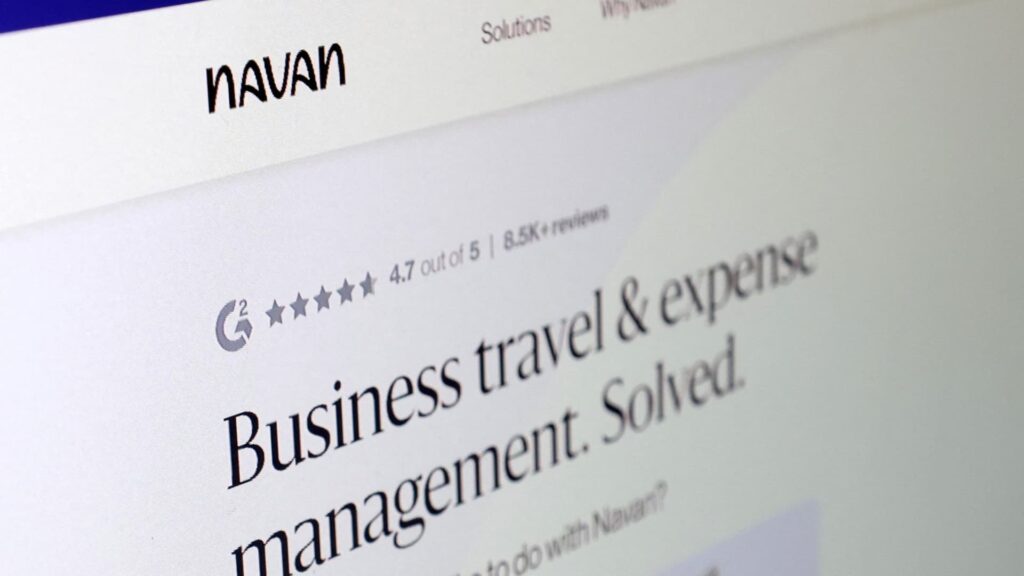Corporate travel and expense management platform Navan fell by as much as 15% in its first trading day on the Nasdaq under the ticker symbol “NAVN” after its successful initial public offering.
The Navan IPO, which priced on Wednesday night, valued the business-to-business software vendor at $6.2 billion, raising $923 million and with shares settling at the midpoint of its deal range, $25 per share. The valuation was roughly $3 billion less than where private investors last valued Navan in 2022 in a $300 million round.
Launched by CEO Ariel Cohen and co-founder Ilan Twig in 2015, Navan set out to disrupt a business travel sector where incumbents relied on clunky legacy tools and fragmented workflows.
The Palo Alto-based company, formerly called TripActions, refers to itself as an “all-in-one super app” for corporate travel and expenses.
Customers include Geico, Zoom, Lyft, OpenAI, Unilever, Anthropic, Adobe, Christie’s, and Blue Origin.
“We really care about the traveler, the road warrior,” said CEO Ariel Cohen in a CNBC interview on IPO day.
Navan ranked No. 39 on this year’s CNBC Disruptor 50 list, and has made the list for two consecutive years.
Navan’s big day is also a huge win for venture investor Oren Zeev, who runs the rare one-person VC firm and at the IPO price was expected to have a stake in Navan worth over $1 billion, having first invested in the founders in 2013, two years before Navan came to life. “It’s a first for me,” Zeev told CNBC of having an early-stage investment result in a $1 billion payday. He has no office, no assistant, no one on payroll at all, but a portfolio of 50 companies (40 where he sits on the board, including Navan).
Cohen said Navan’s focus on business travel and expensing allows it to not only support the largest companies in the market but companies with as few as 10 employees. The idea, regardless of size, is that any companies with travelers can make sure “they are not wasting their time,” he said in his “Squawk Box” interview.
According to Cohen, it can take on average 45 minutes to book a complex business trip using traditional methods, but with Navan the process has been whittled down to seven minutes, and has led to 15% savings for customers.
It has also been pushing further into AI, with a virtual assistant named Ava handling approximately 50% of user interactions, and a proprietary AI framework called Navan Cognition supporting its platform, as well as proprietary cloud infrastructure.
“You are always one click away from Ava our chatbot to fix a flight, connect to a new hotel … whatever you need,” Cohen said.
Credit card swipes, corporate calendar items, and photos snapped on a phone of receipts can all go straight into AI analysis.
With Ava handling 50% of customer discussions, Cohen says the era of long hold times with travel agencies are a thing of the past, whether it is a natural disaster or the recent airport delays and closures that creates travel headaches.
“You don’t have to wait with us. She will take care of it,” he said.
Navan does have a lot of competitors, from niche players like Expensify to enterprise software heavyweights like Oracle and SAP.
Expensify stock has cratered since its 2021 IPO, down to under $2 per share after its $27 IPO price.
Cohen says when it comes to the competition, Navan believes it can separate itself from the pack with its focus on the traveler. No one likes to deal with expense reports or spend hours on the phone with travel agents, but “that’s what we do,” he said. “We know how to support you really fast and we know there is an interruption and we are trying to understand your journey as a traveler,” he added.
Navan reported trailing 12-month revenue of $613 million (up 32%) across over 10,000 customers, and gross bookings of $7.6 billion (up 34%), according to its S-1 filing. For the July quarter, Navan recorded a $38.6 million net loss on $172 million in revenue, which was up about 29% year over year, but fell short of its previous timeline for profitability.
The IPO market has bounced back to life in 2025, fueled by a mix of hot AI and crypto names and more mature tech companies that grew in the past decade of Silicon Valley startup funding, such as Coreweave, Circle, Figma and Klarna (Navan was founded in 2015).
There have been 182 IPOs priced this year, an increase of 42.2% from last year, according to IPO tracker Renaissance Capital, with total deal proceeds of $33.3 billion up just under 17% from last year.
Sign up for our weekly, original newsletter that goes beyond the annual Disruptor 50 list, offering a closer look at list-making companies and their innovative founders.
https://www.cnbc.com/2025/10/30/travel-tech-navan-ipo-nasdaq-stock-price.html


